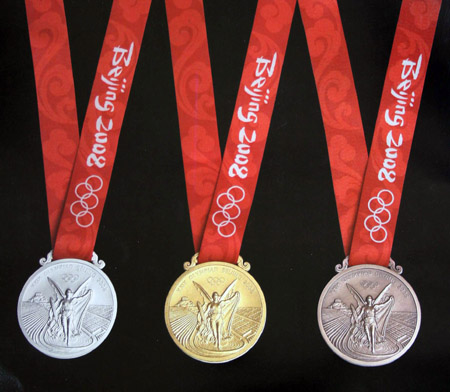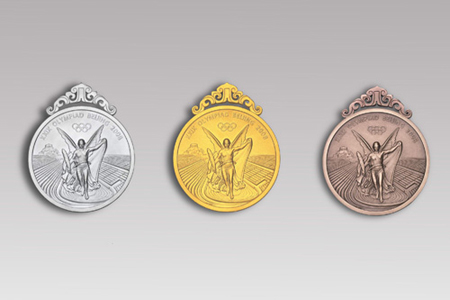| Tools: Save | Print | E-mail | Most Read |
| Victory Medals |
| Adjust font size: |
Obverse side of the Medal and the Ribbon. On the occasion of the 500-day countdown to the opening of the Beijing Olympic Games, the Organizing Committee for the Games of the XXIX Olympiad (BOCOG) unveiled the Games' victory medals on March 27.
Reverse side of the Medals On the occasion of the 500-day countdown to the opening of the Beijing Olympic Games, the Organizing Committee for the Games of the XXIX Olympiad (BOCOG) unveiled the Games' victory medals. BOCOG Executive Vice-President Jiang Xiaoyu attended the unveiling ceremony and delivered a speech at the
The medals are Noble and elegant, the medals are a blending of traditional Chinese culture and the Olympism. It gives the winners of the Games great honor and acclamation as recognition of their achievement. The IOC has strict stipulation on the Olympic victory medals' material, identification, weight, size and drawing. The medals for the champion and the runner-up are made of pure silver, and the champion's medal must be plated with gold weighing not less than six grams each. For the first time jade is used for the The design not only meets the IOC requirements, but also expresses praise and honor that the Chinese people cherish for the Olympic Spirit and the Olympic athletes. In his speech, chairman of the evaluation panel Jiang Xiaoyu said the Beijing 2008 Games medals will be a major part of the Olympic legacy for The medal box, ribbon and certificate, which were released simultaneously, also embody aesthetic taste of traditional Chinese culture and reflect the distinct Chinese characteristics and style. The medal box is a wooden lacquer box made by traditional Chinese techniques. The box is rectangular in shape, with four slightly curving sides of its lid and base, a symbol of heaven and earth, which conveys the message of happiness and best wishes for the world. The ribbon is exquisitely designed with cloud pattern woven on the red strap, sending out joyful and festive atmosphere. The certificate is made of thin silk and rice paper, an integrated whole of traditional techniques and modern printing. On January 11, 2006, BOCOG launched a global campaign to solicit design proposals for the medals of the 2008 Games whilst inviting eleven professional organizations, including China Banknote Printing and Minting Corporation, the Central Academy of Fine Arts, and Academy of Arts & Design of Within three months, 265 entries were sent in from 25 provinces (municipalities, and autonomous regions) and Hong Kong Special Administration Region (SAR) of BOCOG called in a panel of experts and academies in the fields of arts, sculpture and mintage, thereafter, for two round selections of the 179 valid entries, and had the medal proposal improved during the process. BOCOG and IOC passed the final proposal on January 11, 2007 and February 8, 2007 respectively. ( |
| Tools: Save | Print | E-mail | Most Read |
 |
| Related Stories |


